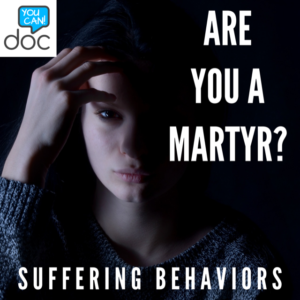Check out:
Brief History of Codependence
How Do Normal Families Adjust To Addiction?
Rescuing Behaviors – First Responders
Persecuting Behaviors
Suffering behaviors are also known as being a “victim” or a “martyr.” Suffering behaviors typically occur after the codependent has tried everything. They have tried to rescue or enable the identified person without success. Next, they have tried to persecute – yell or control the identified person into change. Again with no success. So often they give up and suffer. A martyr willfully suffers in the name of love or duty.
Typical Suffering Behaviors Include:
Guilt
Typically, codependents ask themselves what they might have done to cause the identified person to have the problem (e.g. alcohol, viewing porn, anger) in the first place and how they might have prevented it. They might ask themselves, “What did we do wrong?” Often they review every detail of the identified person’s life. Many families who seek counsel report something like “We must have failed somewhere?” In a codependent’s thinking, one plus one is supposed to equal two. That is, if there is an addiction problem then there must be a parent or spouse problem. As a result, codepndents look and find reasons to feel guilty, regardless.
Is some cases, codependent parents may have indeed made some serious mistakes, and were abusive to their child, either physically or emotionally. Such behaviors certainly can predispose a person to substance abuse or some other problem. Often at this stage the codependent feels unworthy to maintain a church calling or even call upon God. They believe they are being justly punished for their sins by having a loved one suffer from an addiction or some other problem. Religious codpenendents not only carry the “oughts and shoulds” of their own making but also of their religious beliefs. Instead of “grace” they experience “guilt.”
Depression and Defeat
The end result of suffering behaviors is defeat. Nothing has worked. Prescription drug use and counseling might have been sought by the codependent to deal with the identified person. Withdraw from social activities, excessive worrying, and possible physical ailments begin to occur. Occasional thoughts of death may also exist. One good mother reported “I didn’t want to kill myself, but I often wished that my car might hit a telephone pole or something. I couldn’t stand the thought of my son being a drug addict and in prison.” Codependents acknowledge their powerlessness over their own lives and that of the addict. They experience in a personal way what Christ taught in Matthew 10:36: “And a man’s foes [enemies] shall be they of his own household.”
Loss of Personal Freedom
When a codependent feels responsible for how the identified person acts or feels, eventually they are led into bondage. As a codpendent assumes responsibility for the identified’s acts or feelings, the following occurs:
- You become subject to manipulation or control by the identified person.
- You eliminate yourself as a resource to the identified person.
- You tend to rescue the identified person.
- Your self-esteem goes down.
- You become depressed and experience mood swings based on the identified person’s behavior.
- You interfere with God’s great gift of agency and the law of justice.
- You are not free to act for yourself
I remember well the story, a parents of an adult drug addict still living at home. The father pulled a large set of keys out of his pocket. The father explained “Our son steals everything… we have to keep everything locked up…”
Ways to Tell If You Are Being a Martyr in Your Relationship
 You are angry and resentful because your relationship is disappointing to you. Often, you think that the main problem rests in your spouse’s behavior. In your opinion, your spouse or mate should be doing things differently, and this would solve everything.
You are angry and resentful because your relationship is disappointing to you. Often, you think that the main problem rests in your spouse’s behavior. In your opinion, your spouse or mate should be doing things differently, and this would solve everything.
You communicate with people who cannot make any changes. You may talk to friends, for example, rather than communicating directly with your spouse or mate.
You whine, scapegoat, complain, and may even describe yourself or see yourself as a victim. Although you may have endured some bad experiences in your relationship, you fail to own how you create, promote, or allow these outcomes.
You have a hard time owning your role in the problems that you discuss. Rather than saying, “Next time, I’m going to ___,” you stay stuck in what your partner should have done differently. If someone who you complain to offers a suggestion, your first reaction is to reject it. Following this, you might find that you rationalize or justify why you must continue to behave as you are.
The problem is chronic problem—it has endured more than three months. In addition, you see yourself as chronically unhappy in the relationship, and its deeper problems remain unsolved.
You begin to see yourself as a storyteller, moving from one negative story to the next. You may even find yourself rehearsing what you’ll tell friends and family or a therapist, coach, or preacher, rather than rehearsing strategies to actually correct the problems.
Underneath your anger and resentment, there may be depression and fear. These feelings tend to surface after the storm of your anger.
You may appear very capable to others, but you really see yourself as dependent upon your spouse or partner. This leads you to avoid asking for what you want directly, being assertive, getting help, or leaving the relationship.
You may behave as though you are trapped, even when some of your problems may have ready solutions. Trapped people often fluctuate between acting helpless and lashing out.
Are You A Relationship Martyr?
Co-dependency Mental Health America

